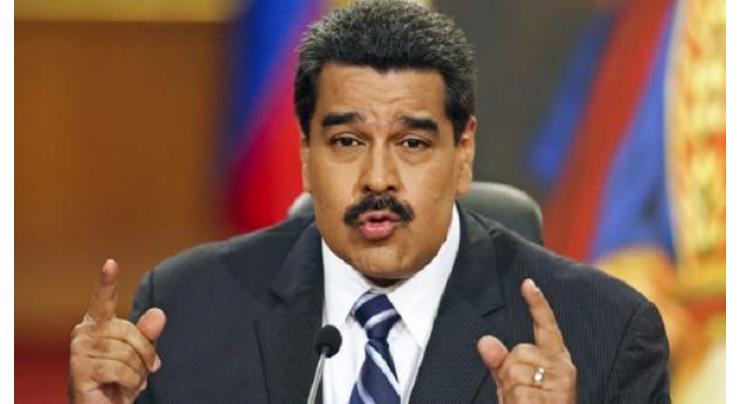
New Venezuela Protests After Anti-Maduro Recall Delayed
Fahad Shabbir (@FahadShabbir) Published September 16, 2016 | 09:25 PM

CARACAS, (APP - UrduPoint / Pakistan Point News -16th Sept,2016) - Crisis-torn Venezuela's opposition held new protests Friday after electoral authorities announced the latest delay in the process of calling a referendum on removing President Nicolas Maduro from power.
Hundreds of protesters marched in Caracas carrying Venezuelan flags and a giant banner reading "We won't take it," after electoral authorities indefinitely postponed announcing dates for the final stage in the referendum process.
Maduro's opponents, who blame the leftist leader for a crushing recession and severe food shortages, must collect four million signatures in three days to trigger a recall referendum. The National Electoral Council (CNE) had been due to announce the timeline Friday.
But late Thursday it said the announcement -- which had already been pushed back from Tuesday -- would have to wait until opposition protests no longer threatened the safety of its staff. The speaker of the opposition-majority legislature, Henry Ramos Allup, accused the authorities of "sabotaging" the referendum.
He called on Venezuelans to flood the streets in protest, but later tweeted that the security forces were blocking people from entering the capital. "Since early this morning the repressive regime has closed off roads into Caracas to prevent people from arriving," he said.
Protesters were at one point blocked by police during their march, prompting scuffles. The center-right opposition coalition behind the referendum push, the Democratic Unity Roundtable (MUD), has been racing to complete the bureaucratic obstacle course to call a vote by the end of the year.
Polls indicate Maduro would likely lose a recall referendum, but it must be held by January 10 in order to trigger new elections. After that date, his hand-picked vice president would serve out the rest of his term, to 2019.
That would extend the socialist "revolution" launched in 1999 by late president Hugo Chavez to at least 20 years. The CNE has already said it is looking at late October for the three-day petition drive.
The opposition says that is too late. It alleges the electoral authorities are in bed with Maduro -- along with the Supreme Court, which has systematically blocked opposition bills since it won control of the legislature in December.
Seeking leverage, the opposition has organized a series of protests. It estimates a million people took to the streets in the largest one, on September 1. - Battle over timeline - ======================== If the opposition gets the required four million signatures in favor of a recall vote -- 20 percent of the electorate -- the CNE will have a month to verify them, then three months to organize the referendum.
A late October petition drive would probably mean a referendum in March 2017. Political analysts warn the country risks erupting into unrest if it does not happen before then. Eighty percent of Venezuelans want a change of government, according to the polling firm Datanalisis.
The oil-rich country has skidded into crisis as global crude prices have plunged since mid-2014, pushing Chavez and Maduro's socialist model to the brink. Venezuelans spend long hours lining up outside supermarkets and pharmacies, only to find bare shelves and soaring prices inside.
The country is facing its third year of deep recession this year, with inflation set to top 700 percent, according to the International Monetary Fund. Maduro blames the crisis on an "economic war" by the Venezuelan elite backed by "American imperialism." To alleviate growing hunger, he has launched an emergency supply plan overseen by no fewer than 18 army generals -- one each for rice, beans, toilet paper and 15 other staples.
Related Topics
Recent Stories

Bismah Maroof announces immediate retirement from international cricket

Malala expresses unwavering support for Gaza people

Selection committee dissolved over Pakistan women cricket team's poor performanc ..

Punjab CM Maryam Nawaz in police uniform at Chung police center

Currency Rate In Pakistan - Dollar, Euro, Pound, Riyal Rates On 25 April 2024

Today Gold Rate in Pakistan 25 April 2024

Mired in crisis, Boeing reports another loss

Session Awarding Ceremony 2024 held at Cadet College Muzaffarabad

Austrian ski great Hirscher to make comeback under Dutch flag

Pakistan, Japan agrees to convene 'Economic Policy Dialogue'

FM Dar conveys deepest sympathy on torrential rains devastation in UAE

Spain PM Sanchez says weighing resignation after wife's graft probe
More Stories From World
-
Philippines grapples with measles, pertussis outbreaks: UNICEF
7 minutes ago -
450,000 stimulant tablets seized in Myanmar's Yangon
7 minutes ago -
Mining giant Anglo American shares jump on BHP bid
7 minutes ago -
Cambodia's rubber export up 5.1 pct in Q1
7 minutes ago -
Zimbabwean president reshuffles cabinet
7 minutes ago -
Football: Italian Cup result
7 minutes ago
-
Sugar futures close lower
17 minutes ago -
China-donated relief supplies arrive in Papua New Guinea
17 minutes ago -
ChiNext Index closes lower Thursday
17 minutes ago -
BHP launches $38.8 billion takeover bid for rival Anglo American
27 minutes ago -
AstraZeneca profit up on strong sales of cancer drugs
27 minutes ago -
93 arrested at LA university pro-Palestinian protest for trespassing
27 minutes ago